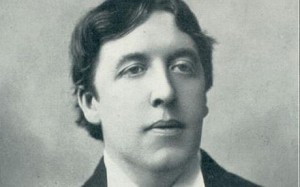Oscar Wilde is known more for his biting wit than anything, which is why his poem, “The Grave of Keats,” felt like such a novelty to me. The piece is tender and sorrowful, and you can feel the poet’s regret in his words. It also masterfully weaves in Biblical allusions while sticking very closely to a strict rhyme scheme:
Rid of the world’s injustice, and his pain,
He rests at last beneath God’s veil of blue:
Taken from life when life and love were new
The youngest of the martyrs here is lain,
Fair as Sebastian, and as early slain.
No cypress shades his grave, no funeral yew,
But gentle violets weeping with the dew
Weave on his bones an ever-blossoming chain.
O proudest heart that broke for misery!
O sweetest lips since those of Mitylene!
O poet-painter of our English Land!
Thy name was writ in water–it shall stand:
And tears like mine will keep thy memory green,
As Isabella did her Basil-tree.
To fully grasp the poem, the reader should know that poet John Keats died when he was just 25, after battling tuberculosis for approximately a year. This adds more meaning to the lines, “Taken from life when life and love were new/The youngest of the martyrs here is lain” (3-4). Having been on this planet only into his mid-twenties, life certainly was “new” to the writer. And I think the inclusion of “love” emphasizes this point, since he would barely have experienced this aspect of life at that stage. One also has to know a bit about religion to understand the poem, as the next line makes reference to Saint Sebastian, a Christian saint and martyr who was killed young: “Fair as Sebastian, and as early slain” (5). Wilde believes that Keats was a good enough man to be compared to Sebastian, and thus he notes what they have in common.
Though Wilde immortalizes his fellow poet as a hero of England by calling him the “poet-painter of our English Land” (11), he names another location as well: “Mitylene” (10), which is a city on the island of Lesbos mentioned in the Bible, evidently known for its “sweet-lipped” citizens. And although these allusions may not be common knowledge to the average reader, the most impressive (and touching) references, in my opinion, are those expressed in the poem’s last three lines, which refer to Keats and Keats’s own work. John Keats himself requested that his tombstone read, “Here lies one whose name was writ in water,” which is what line 12 alludes to. However, as Wilde’s added note makes clear, Keats will never be forgotten: his name “shall stand” (12).
Oscar Wilde underlines how he himself will keep Keats’s memory alive in the final two lines of the poem, when he speaks of Keats’s poem, “Isabella, or the Pot of Basil”: “And tears like mine will keep thy memory green,/As Isabella did her Basil-tree” (13-14). Wilde, by mourning Keats and always keeping him in his thoughts, will ensure that Keats’s legend will carry on. He compares this to Isabella in Keats’s poem, whose lover is murdered; she then buries his severed head in a pot of basil which she tends by crying tears over it. Wilde devotedly honors Keats’s memory by alluding to one of Keats’s own poems alongside Biblical references. This effectively conveys Wilde’s view, that Keats is one of the greatest poets to ever have lived. Not only does he leave behind him a stellar reputation, but Keats is also “rid of the world’s injustice, and his pain” (1). After a tough struggle with a lethal disease, Keats is able to “rest[] at last beneath God’s veil of blue” (2).
Suggestions for Further Reading:
- More on John Keats
- Another poet’s views on celebrating the past

 “The Grave of Keats” by Oscar Wilde
“The Grave of Keats” by Oscar Wilde




 Our Monthly Tip: Make an “In Case of Death” File to Ease Loved One’s Grief
Our Monthly Tip: Make an “In Case of Death” File to Ease Loved One’s Grief
 Passing of Beloved Comedian Births a New Comedy Festival
Passing of Beloved Comedian Births a New Comedy Festival















